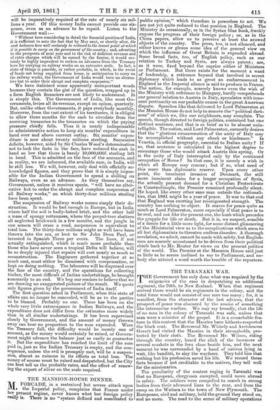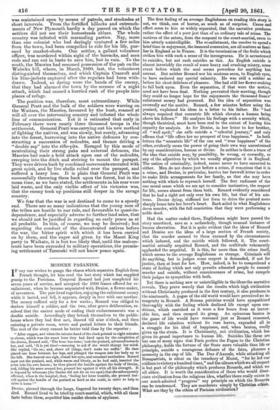THE TARANAKI WAR.
THE G-overnment has only done what was required by the exigencies of the case in despatching an additional regiment, the 70th, to New Zealand. When that regiment arrived there would be six regiments in the colony, and the total force would not consist of one man too many ; for, it is manifest, from the character of the last advices, that the prospect of peace was obscured by the smoke of something like internecine warfare. We may say broadly, that the life of no man in the colony of Taranaki was safe, unless that man were a minister of the gospel. It is a remarkable fea- ture in this contest that the Maories have hitherto respected the black coat. The Reverend Mr. Whitely and Archdeacon Govett had visited the Maories in their strongholds, pro- tected by their cloth. The Reverend Mr. Wilson, riding through the country, heard the click of the hammers of several muskets in the fern close beside him, and the next moment he was surrounded by a band of natives, lying in wait, like banditti, to slay the wayfarer. They told him that nothing but his profession saved his life. We record these facts because if not creditable to the natives, they tell well for the missionaries.
The peculiarity of the contest raging in Taranaki was that no European, clergymen excepted, could move abroad in safety. The soldiers were compelled to march in strong bodies from their advanced lines to the rear, and from the camp on the Waitara to the town of New Plymouth. The Europeans, civil and military, held the ground they stood on, and no more. The road to the scene of military operations was maintained open by means of_patrols, and stockades at short intervals. From the fortified hillocks and entrench- ments of New Plymouth hardly a day passed on which the settlers did not see their homesteads ablaze. The whole country was infested with marauding parties. Nay, more than one colonist who had daringly ventured a few miles from the town, bad been compelled to ride for his life, pur- sued by musket-shots. One settler, a gallant volunteer officer, was murdered within sight of the barracks, and men rode and ran out in haste to save him, but in vain. To the south, the Maories had resumed possession of the pah on the Waireka hill, where, in March, 1860, last, the volunteers distinguished themselves' and which Captain Cracroft and his blue-jackets captured after the regulars had been with- drawn. Indeed, so daring were the bands of the enemy, that they had alarmed the town by the menace of a night attack, which had caused a hurried rush of the people into places of refuge.
The position was, therefore, most extraordinary. While General Pratt and the bulk of the soldiers were warring on the Waitara, the Maories, favoured by the bush, roamed at will all over the intervening country and infested the whole line of communication. Yet it is estimated that early in February there were nearly three thousand troops in the settlement. General Pratt was carrying out his new method of fighting the natives, and was slowly, but surely, advancing into the forest, burrowing into the native defences by con- structing a succession of redoubts, and thence driving a "double sap" into the rifle-pits. Enraged by this mode of neutralizing their strong paha and external defences, the Maories had made a bold attack upon one of the redoubts, creeping into the ditch and striving to mount the parapet. They were driven back by combined movements executed with great spirit, and by live shells rolled over the parapet, and suffered a heavy loss. It is plain that General Pratt was successfully throwing them back upon the forest, but in the mean time, as we have stated, the settlements in his rear were laid waste, and the only visible effect of his victories was, that the enemy took up positions still deeper in the savage country.
We fear that the war is not destined to come to a speedy end. There are so many indications that the young men of the tribes are hostile to our rule, and favourable to quasi-in- dependence, and especially adverse to further land sales, that i we should not be justified in regarding an early peace as at all probable. In this, of course, we may be deceived; but regarding the conduct of the discontented natives before the war, the bitter spirit with which it has been carried on by them, and the eager aid given by the Maori King party in Waikato, it is but too likely that, until the malcon- tents have been expended in military operations, the promis- ing settlement of Taranaki will not know peace again.































 Previous page
Previous page